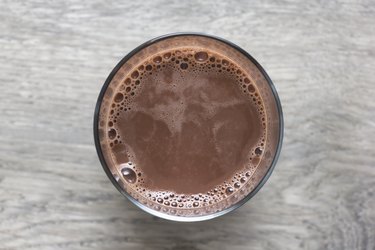
Drinking a protein shake gives you a convenient way to support muscle repair and growth after a strenuous workout, among other benefits. Shakes come in delicious flavors, sometimes with ingredients such as probiotics and super-foods added to deliver maximum nutrition and digestibility. However, it's not uncommon to feel sick after a protein shake. You can investigate a few possible reasons to solve the problem and enjoy your protein shakes.
Check the Ingredients
Video of the Day
Scan the ingredients list for any culprits that could cause protein shake nausea, which can be accompanied by gas and bloating. Some common culprits include:
Video of the Day
Dairy Ingredients
If you have lactose intolerance, those protein powder side effects could be telling you that you're not equipped to handle the amount of casein or whey in your protein shake. Although both are dairy-based ingredients, casein is slow-digesting and stays in the stomach longer. This means for the lactose intolerant, hours of uncomfortable bloating and nausea as the substance slowly makes its way through your system.
Whey digests quickly, and comes in three types. Whey concentrate has the most lactose, the culprit that makes you feel queasy. Whey isolates are a better bet, as they have very little lactose. However, those who are very sensitive would do well to shell out for highly processed hydrolyzed whey, which has no lactose and is the most digestible form of whey protein.
Sweeteners
Because protein powders aren't about adding a lot of sugars and carbs to their product to make them taste good, it's not uncommon to find artificial sweeteners. Although sweetening agents like stevia and sucralose are usually well-tolerated in limited amounts by most people, sugar alcohols such as mannitol and sorbitol can make you gassy and nauseous, especially if you drink lots of protein drinks. Isolated fructose can also trigger protein shake nausea in some people.
Fiber
Although inulin is a natural fiber found in many plants, gulping down large quantities of the stuff in your protein shakes could leave you with digestive woes. It's not digested or absorbed by the body; instead, it goes through to your bowels to feed digestive bacteria that help your body process fats and break down other ingredients for improved bowel function. Too much inulin causes flatulence, cramping, diarrhea and nausea.
Wait It Out
As you pound out your last reps at the gym, your body might yearn to pound down a protein shake as soon as the last weight gets settled in the rack; however, gulping the concoction down too fast can leave you retching. Your blood flow has focused on going to your muscles, not your digestive tract, while you were working out, so drinking too soon can give you protein shake nausea. Give your body a few minutes to recoup before lifting the shake to your lips. And when you do, sip it — don't slam it down. The shock on your digestive system as it gets suddenly flooded can make it come right back up or leave you with a sour stomach.
Water It Down
That rich, creamy protein shake mixed up with a banana, almond butter and other ingredients could just be creating a confusing sludge in your stomach that leaves it grumbling. Although it's tempting to add ingredients when replacing a meal with a protein shake, there's no need to make things more difficult on your stomach. Eating a proper meal makes your digestion work to break down food, thus burning more calories.
Remember, your protein shake is a supplement: Mix it with plenty of water and avoid the temptation to add extra scoops to the glass, and you're less likely to end up feeling like things are turning to concrete in your stomach.
Ramp It Down
Your nausea might just be due to the fact that you're getting too much. It's easy to partake in too much of a good thing with the convenience of protein powder in today's busy world. Use the USDA's online daily recommended intake calculator to determine how much protein your body needs. Although the average person needs 0.8 grams of protein per kilogram of body weight — that's 2.2 pounds — each person's individual needs vary according to age, activity level and other lifestyle factors.
Change It Up
If your stomach starts to rumble when you even think about mixing up a protein shake, it might be time to switch it out for a plant-based protein powder. Pea, chia, hemp, rice and other plant sources, when combined, deliver a complete amino acid profile without animal-based protein.
Check It Out
If your nausea persists when you drink protein shakes, schedule a checkup with your doctor. In rare instances, protein powder can cause the formation of a phytobezoar, a solid composition of plant or animal matter anywhere along the digestive tract. Protein powder digesting slowly in the stomach can cause phytobezoar formation over time, bringing with it symptoms of protein shake nausea such as abdominal pain, vomiting and sometimes upper gastrointestinal bleeding. People who have had ulcers, gastric surgeries or other conditions affecting the digestive tract are particularly vulnerable.
- Train for Her: 5 Reasons Your Protein Shake Is Making You Feel Sick
- Men's Journal: Protein Powder Side Effects
- Mayo Clinic: Whey Protein
- US National Library of Medicine National Institutes of Health" Protein Shakes: An Unusual Cause of Gastric Phytobezoar
- United States Department of Agriculture National Agricultural Library: DRI Calculator for Healthcare Professionals
- Metric Conversions: Kilograms to Pounds
- Merriam Webster Dictionary: Phytobezoar
- Web MD: Inulin
- Men's Health: 8 Most Common Protein Shake Mistakes
- Orgain: Plant-Based Protein Powder
- Orgain: Get Picky With Your Protein
- Puget Sound Family Health: Visual Guide to Plant-Based Protein